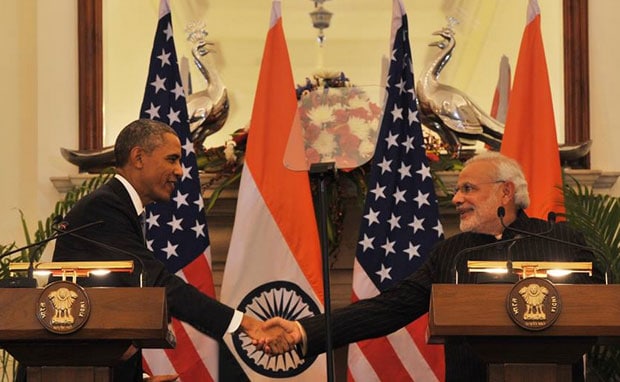
India and the US broke the logjams that had been proving a hurdle on the implementation of the civil-nuclear deal signed in 2009. The ball is now in the court of the companies that are expected to fructify it. Significant agreements were also made on several other fronts, including the defence, economic ties, climate change and renewable energy.
"The deal is done," said Foreign secretary Sujatha Singh during a meet with the media after the bilateral meeting between US President Barack Obama and Prime Minister Narendra Modi. What was holding it up was an US demand to track the nuclear material it supplies to India, which New Delhi said was intrusive.
"We are committed to moving towards full implementation," President Obama later told a joint news conference. "This is an important step that shows how we can work together to elevate our relationship."
The two countries have also finalised the defence framework for the next 10 years. With the India-US Defence Technology and Trade initiative, the defence trade between the two countries is expected to grow by leaps and bounds.
"The DTTI is an initiative there is no precedent for it. Its purpose is to identify a technology which is viable," said S Jaishankar, India's ambassador to the United States, who also addressed the media. But the modalities for the defence trade -- which would involve pathfinder projects which means joint development and production -- need to be worked out.
In economic field, both sides will resume talks on high investment bilateral treaty. Last year, the countries had targeted a five-fold increase in annual trade to $500 billion. But US business leaders have been frustrated by limits on access to the Indian market.
The two countries have also agreed on the need to develop clean energy and reduction of greenhouse gas emission. There is a clear US interest in participating in the solar programme, Mr Jaishankar said. "It is up to US to participate in a way consistent with their outlook."
Both countries agreed to sign a memorandum on Energy Security, Clean Energy and Climate Change, which will be in place for five years, as early as possible.
All issues of regional concern - including the US exit from Afghanistan and terrorism - were also addressed during the meet. India and the US have agreed to work closely together in Afghanistan for a sustainable, inclusive and democratic political order.
The Prime Minister also raised the issue of visa curbs for Indians in the US. The US has said that the concerns of India on this front will be addressed.
The two countries also agreed to convene a dialogue on higher education to extend cooperation in this field and strengthen partnerships between Indian and US universities and community colleges, improve student and scholar mobility, and promote faculty collaboration.

